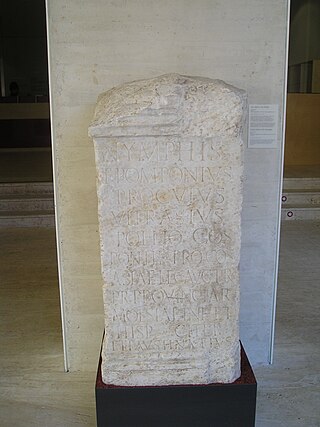Related Research Articles

Titus Pomponius Proculus Vitrasius Pollio was a Roman senator, who held several imperial appointments during the reign of Marcus Aurelius. He was suffect consul in an undetermined nundinium around 151; he was a consul ordinarius in the year 176 with Marcus Flavius Aper as his colleague.
Servius Cornelius Scipio Salvidienus Orfitus was the name of several Roman men who lived during the early Roman Empire. They were descendants of Orfitus who was adopted by Servius Cornelius Scipio, an otherwise unknown member of the patrician branch of the Cornelii Scipiones.
Lucius Venuleius Montanus Apronianus was a Roman senator of the first century. He was suffect consul for the nundinium of January to April AD 92 with Qunintus Volusius Saturninus, replacing the emperor Domitian.
Marcus Metilius Aquillius Regulus was a Roman senator of the second century AD. A member of the patrician order, he held the office of consul ordinarius in 157 with another patrician, Marcus Vettulenus Civica Barbarus, as his colleague.
Marcus Vettulenus Civica Barbarus was a Roman senator of the second century AD. A member of the Patrician class, he held the office of consul ordinarius in 157 with another patrician, Marcus Metilius Aquillius Regulus, as his colleague. Barbarus was also a member of the sodales Antoniniani, a religious fraternity which attended to the cult of the emperor Antoninus Pius.
Lucius Dasumius Tullius Tuscus was a Roman senator who was an amici or trusted advisor of the emperors Antoninus Pius and Marcus Aurelius. He was suffect consul in the nundinium of April to June 152 AD as the colleague of Publius Sufenas.

Lucius Venuleius Apronianus Octavius Priscus was a Roman senator of the second century. He was ordinary consul as the colleague of Quintus Articuleius Paetinus in 123. Subsequent to his consulate, Priscus was proconsular governor of Asia in 138 and 139. He is known primarily through inscriptions.
Lucius Novius Crispinus Martialis Saturninus was a Roman senator of the second century. He was suffect consul in either 150 or 151 AD. His life is primarily known from inscriptions.
Marcus Pontius Laelianus Larcius Sabinus was a Roman senator and general who held a series of offices in the emperor's service. He was suffect consul for the nundinium of July-August 145 as the colleague of Quintus Mustius Priscus. Laelianus is primarily known through inscriptions.
Quintus Camurius Numisius Junior was a Roman senator active during the later second century AD. He was suffect consul for a nundinium in the first half of the year 161 as the colleague of Marcus Annius Libo.
Gaius Javolenus Calvinus was a Roman senator of the 2nd century AD who occupied a number of offices in the imperial service, as well as serving as suffect consul between 140 and 143.
Quintus Pompeius Sosius Priscus was a Roman senator active in the mid-second century AD, who held a number of offices in the emperor's service. Priscus served as ordinary consul for the year 149 as the colleague of Lucius Sergius Salvidienus Scipio Orfitus. His life is known entirely from inscriptions.
Lucius Pullaienus Gargilius Antiquus was a Roman senator, who held a number of offices in the imperial service during the reign of Antoninus Pius. He is known to have been a suffect consul in the early years of the reign of Marcus Aurelius, most likely in the year 162. He is known entirely from inscriptions.
Lucius Neratius Proculus was a Roman senator, who held several posts in the emperor's service. He was suffect consul in either the year 144 or 145. Proculus is known primarily from inscriptions.
Quintus Cornelius Proculus was a Roman senator, who was active during the middle of the second century AD. He was suffect consul in the nundinium of November–December 146 as the colleague of Lucius Aemilius Longus. Proculus is known entirely from inscriptions.
Lucius Coelius Festus was a Roman senator, who was appointed to several praetorian offices during the reign of Antoninus Pius. He was suffect consul in the nundinium of July-September 148 with Publius Orfidius Senecio as his colleague. Mireille Corbier describes his known career as that of an administrator occupying a modest spot in the Senate. Festus is known entirely from inscriptions.
Lucius Sergius Paullus was a Roman senator, who was active during the reign of Marcus Aurelius. He was twice consul: the first time attested 23 September of an unknown year as suffect consul with [? Lucius Nonius Calpurnius] Torquatus Asprenas as his colleague; and as consul ordinarius for 168 as the colleague of Lucius Venuleius Apronianus Octavius Priscus.

Titus Caesernius Statianus was a Roman senator who held a number of appointments in the Imperial service during the reigns of Hadrian and Antoninus Pius. He was suffect consul in the nundinium of September-October 141; his colleague's name is not known. His full name is Titus Caesernius Statius Quinctius Statianus Memmius Macrinus.
Titus Caesernius Quinctianus was a Roman senator who held a number of appointments in the Imperial service during the reigns of Hadrian and Antoninus Pius. He was suffect consul in an undetermined nundinium around the year 138. His full name was Titus Caesernius Statius Quinctius Macedo Quinctianus.
Marcus Servilius Fabianus Maximus was a Roman senator, who was active during the reigns of Antoninus Pius and Marcus Aurelius. He was suffect consul in a nundinium in mid-158 with Quintus Jallius Bassus as his colleague.
References
- 1 2 Géza Alföldy, Konsulat und Senatorenstand unter der Antoninen (Bonn: Rudolf Habelt Verlag, 1977), p. 150
- ↑ CIL XI, 1432, CIL XI, 1433
- ↑ Raepsaet-Charlier, Marie-Thérèse. “L’inscription ‘CIL’ XI 1735 Complétée et Les ‘Venulei.’” Latomus 42, no. 1 (1983): 152–55. http://www.jstor.org/stable/41533804.
- ↑ CIL XI, 1433a
- ↑ Alföldy, Konsulat und Senatorenstand, p. 323
- ↑ This list of public and sacred offices are taken from Alföldy, Konsulat und Senatorenstand, p. 327
- ↑ Anthony Birley, The Fasti of Roman Britain (Oxford: Clarendon Press, 1981), pp. 4f